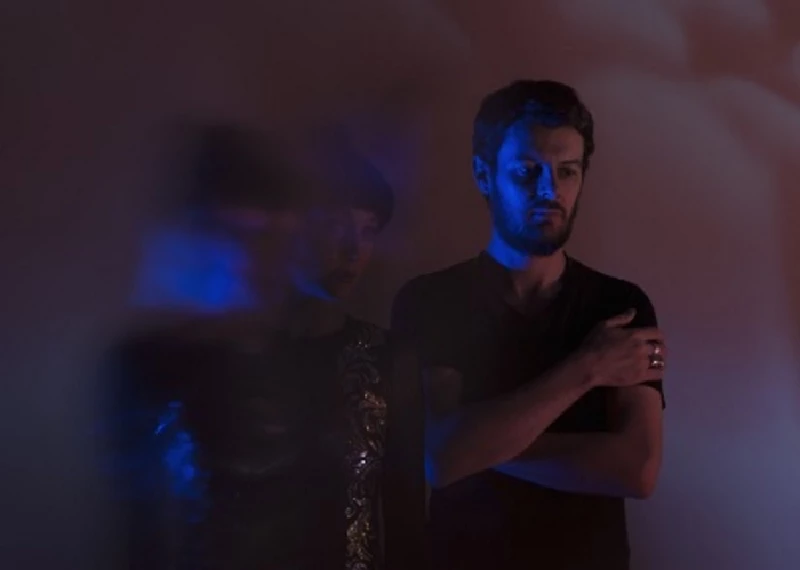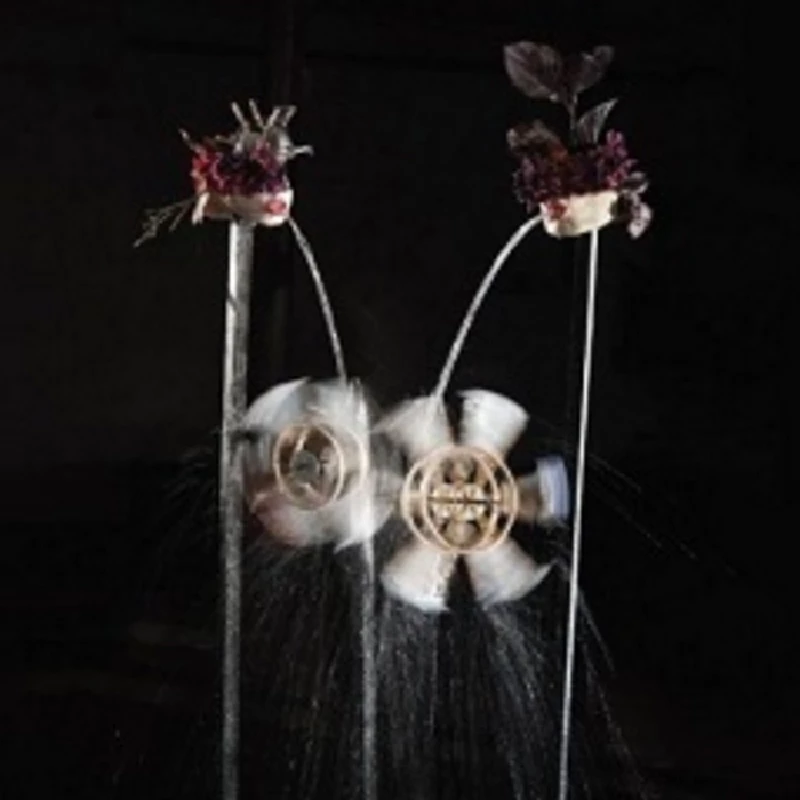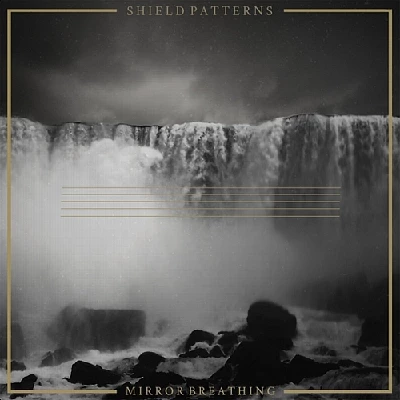Shield Patterns - Interview
by John Clarkson
published: 8 / 12 / 2014

intro
John Clarkson speaks to Richard Knox, the owner of Gizeh Records, about Shield Patterns, the electronic duo that he has formed with Manchester-based singer-songwriter Claire Brentnall; their debut album, 'Contour Lines', and his growing label
Shield Patterns is a Manchester-based electronic group consisting of Claire Brentnall and Richard Knox. The duo released their acclaimed debut album, ‘Contour Lines’, this summer, which, a dense, intense alternative rock record, merges Brentnall’s ethereal vocals with an atmospheric sound. Brentnall, who had previously played and sung in various other Manchester bands, initially started Shield Patterns as a solo project in 2012. After meeting Knox at her first gig under the Shield Patterns moniker in early 2013, the two began collaborating together. Richard Knox, who has been the subject of two previous Pennyblackmusic interviews, released his first album, ‘With Our Arms Wide Open We March towards the Burning Sea’, as one half of Leeds-based ambient/post-rock duo, Glissando, in 2008. Recorded in the aftermath of the break-up of his and vocalist/pianist Elly May Irving’s romantic relationship, it was a brooding, desolate record that captured the former couple’s sense of sorrow and loss. The pair’s second album, the similarly mournful but orchestral ‘The World Without Us’, followed in 2012. Knox also released in 2011 a self-titled LP with the Rustle of the Stars, an improvisational project that he has formed with Parisian multi-instrumentalist and experimental musician Frederic D. Oberland, and two albums of dreamy ambience, ‘Desperate in her Heavy Sleep’ (2012) and ‘You Stood Up for Victory, We Stood Up for Less’ (2013), with instrumental drone trio, A-Sun Amissa. Each of these albums has come out on Knox’s own label Gizeh Records, which now a decade old, releases its recordings on both vinyl and CD. Beyond Knox’s own bands, some of the other acts on Gizeh include Oberland’s experimental film/poetry/alternative rock act, Farewell Poetry; Dutch multi-instrumentalist and minimalist Chantal Acda; Texan electronic two-piece Ormonde and its latest signing, Manchester-based post-rock outfit Last Harbour. Pennyblackmusic spoke to Richard Knox about Shield Patterns, ‘Contour Lines’ and his growing label. PB: You moved from Leeds where Gizeh Records had always been based to Manchester at the start of 2013. Why did you decide to move there? RK: I had spent all my adult life in Leeds really. I wanted to do something different. I had been in a relationship in Leeds that had broken down, and I decided I wanted a change. Manchester seemed like a good place to try something and it has worked out well. PB: You introduced yourself to Claire at what was her first gig under the Shield Patterns moniker. What was the initial appeal to you of her music? RK: She was playing solo at the Night and Day Café in Manchester. There was just something really interesting about what she was trying to do. There was loads of melody in the songs, which I found really appealing. She was also really good on stage and very natural. I was instantly drawn to her. One thing led to another and here we are (Laughs). PB: How quickly after meeting her did you first start collaborating together? RK: It was very quickly. I started out by doing sound for her at a couple of gigs at which she played solo, and then we started having ideas for music and playing together. It all happened within a couple of months actually. PB: ‘Contour Lines’ was recorded in the Welsh countryside. A lot of your previous work – such as with Glissando – was recorded in home studios. Why did you decide to go there to record it? RK: We actually used all the same equipment that I have used in the past. I just took it to a different location. When I first moved to Manchester, I was living in a shared house, so my bedroom was also my studio and all my gear was in there. None of that was really conducive to creativity and having the peace and quiet you need to concentrate and record, so we decided to up and leave and go somewhere else for a week. It worked well. We had total solitude, and the scenery was amazing. There was total peace and quiet, and we could work for as long as we wanted each day. It was really nice. PB: Claire had been writing under the Shield Patterns moniker for a while before you joined the group. How much of the material on the album was material that she had composed beforehand and how much of it was written in collaboration? RK: I would say that it was probably about 75% composed by Claire. She still comes up with most of the original ideas, and then we will play around with those, and I will mess a few things up and change them here and there. Occasionally I will work on a drone and pass it to her. Then she will mess around with that, and we will find something that works somewhere in the middle. We work together a lot on the production, trying to find different ways of mixing songs. The songs are really detailed. There are between forty and sixty different audio tracks on most of them, so the options for how we mix it are huge. We work together on that really meticulously, and try to find the best way to mix each song. PB: The arrangements are, as you say, huge. How easy has it been to transfer that onto stage? RK: Fairly tricky. We decided early on that we didn’t want to use a laptop on stage, and so we use samplers a lot. We also have parts of the recorded track that we trigger when we are playing live as there is more than we can play. We want to represent the songs live in a similar fashion to how they are on the record. Playing live is quite hectic. There is quite a lot going on. We have, however, made the conscious decision to play as much of it live as we can. PB: You have primarily been a guitarist in the past. How easy has it been for you to switch to working extensively with electronic equipment? RK: It has been a good fun. I have really enjoyed it. I like to try different things. At first it took me a little while to get my head around it. Sometimes when you come to something new you have a way that you think that things should be, and it took me a little while to put aside those preconceptions and to think as I normally would when playing guitar or doing anything. When I started treating it as another creative process, it came naturally. It has been a good challenge. PB: You have run Gizeh Records now for ten years. You have admitted in other interviews that you have lived a fairly precarious existence for a lot of that. Has it become easier running it or is it as difficult as it has always been? RK: I think that it is probably as difficult as ever. When you are running a label, you have to constantly face challenges, and once you have conquered one thing you have struggled with then something else takes its place. The label is in a really strong place in terms of the infrastructure and how we run it. The difficulty we have got now is in terms of selling records. In the past the difficulty has been finding a good way to run it and to manage time and all our resources, and now we have got to a point where all that stuff is really good and the thing we actually struggle with is actually shifting records. It is the same for everybody though. It is tough at the moment. PB: In the last couple few years there has been a huge rise in the amount of vinyl being issued. Most labels, if they are putting out an album, have a vinyl edition, but the number of vinyl plants remain pretty small, and there is often a wait of five and six months in production while before it was just a matter of weeks. Gizeh has since its early days been a vinyl label. How much has that affected things? RK: That is a really good question. I think that potentially there is some serious trouble ahead for vinyl. The lead times in production are insane now. We are starting to look at six months in advance to get a vinyl album out on time to the distributors, which is crazy because it is difficult to work so far ahead with artists in advance, especially at the level which we are at. If have you problems with the pressing and if you are not happy with it – the vinyl version of the Ormonde record, for example, that we have released was delayed by a month – then that can really affect sales. I think that people may shy away from producing vinyl because it is causing so many problems. Everybody wants to do vinyl, and the pressing plants are not enough to cope with the demand. It is creating this huge backlog and queue for vinyl. Eventually people are going to say, “Well, I don’t really want to wait that long.” The costs are also going up and up to produce vinyl, and as a result they are also going up in the shops as well. You’re paying £20 or £25 for some things, which seems to me a lot of money. I think that it might end with people going back to producing CDs. There is one big pressing plant in the Czech Republic which most people use, but it can’t do enough to satisfy demand at the moment. It is brilliant that people want to make vinyl, but it has got beyond saturation point in a “can’t do” way. PB: Shield Patterns has been your main priority during the last year. What is the situation with your other bands? RK: This has been the priority for over a year now, and it will remain that way because we are already working on the next record. We have got a big European tour in March and some more UK dates hopefully for April and some festivals for next year, so we are carrying on with it for a bit longer. It has taken off more than I anticipated, so we are going to just run with it for now and to see if we can get the most out of it. The other projects are not even on stand-by. They are just there whenever any of us have the time to do something with them. We have not disbanded any of them. PB: You have recently signed Last Harbour to Gizeh Records as well and will be releasing their next album ‘Caul’ in February. They have put out their last three albums on their own label, Little Red Rabbit. Why did they decide to put out their album on Gizeh Records rather than releasing it themselves as they have done before? RK: David Armes, their guitarist, has been helping me to run Gizeh Records during the last year. We both felt that going through Gizeh was the best option. Little Red Rabbit is at the moment fairly quiet, because David doesn’t have the same amount of the time that he has had in the past to run it. We felt that it was the best option both for what the label needed and also for the band. They felt that they could get the maximum amount of exposure with us. It is also going to be good for us to release something slightly different to what we have released, but there is enough common ground in there with what we have already put out, so it feels very natural. It will also be nice for David to work as he has always done on his own record. PB: Will you be doing both a CD and a vinyl version of ‘Caul’? RK: We are having a few problems with the vinyl as a result of what we discussed. I am not sure how it is going to work out, but hopefully both will be out in February. PB: In recent years Gizeh have released records by acts including Chantal Acda, Farewell Poetry, Tomorrow We Sail, Aidan Baker, the Freemartin Calf and most recently Ormonde. How many of these acts are still on Gizeh and what does the roster consist of now? RK: All of those bands are in a similar situation to Glissando, A-Sun Amissa and the Rustle of Stars. Everyone has other projects going on and nothing is constant, so people are working on things as they go along. Chantal is working on a new record at the moment, but I am not sure what is happening with that as it stands. We will just see where we get to with the records and if we want to work together again. There are no contacts involved with Gizeh Records, so everyone is free to take their music elsewhere if they prefer. Obviously it will be good if they decide to stay with us. PB: Will the next Shield Patterns come out next year? RK: There will be an EP next year in time for the tour which we have nearly finished. I am not sure about a new album, maybe the end of next year, maybe 2016. We will also be releasing two, maybe three albums by new acts, which we will be announcing soon. PB: Thank you.
Band Links:-
https://twitter.com/shieldpatternshttp://www.shieldpatterns.com/
https://www.facebook.com/ShieldPatterns
Picture Gallery:-

soundcloud
reviews |
|
Mirror Breathing (2016) |

|
| Exquisite and atmospheric second album from experimental Manchester-based duo, Shield Patterns |
| Contour Lines (2014) |
most viewed articles
current edition
Carl Ewens - David Bowie 1964 to 1982 On Track: Every Album, Every SongVisor Fest - Valencia, Spain, 26/9/2025...27/9/2025
Editorial - July 2025
Colin Blunstone - Thalia Hall, Chicago, 16/7/2025
John McKay - Interview
Billie Eilish - O2 Arena, London, 10/7/2025
Hothouse Flowers - Photoscapes
Bathers - Photoscapes 2
Bathers - Photoscapes 1
Cleo Laine - 1927-2025
previous editions
Heavenly - P.U.N.K. Girl EPBeautiful South - Ten Songs That Made Me Love...
Trudie Myerscough-Harris - Interview
Pixies - Ten Songs That Made Me Love...
Boomtown Rats - Ten Songs That Made Me Love....
Fall - Hex Enduction Hour
Sam Brown - Interview Part 2
Doris Brendel - Interview
Jimmy Nail - Interview
Blues and Gospel Train - Manchester, 7th May 1964
most viewed reviews
current edition
Amy Macdonald - Is This What You've Been Waiting For?Sick Man of Europe - The Sick Man of Europe
Alice Cooper - The Revenge of Alice Cooper
Phew, Erika Kobayashi,, Dieter Moebius - Radium Girls
Lucy Spraggan - Other Sides of the Moon
Blueboy - 2
Cynthia Erivo - I Forgive You
Davey Woodward - Mumbo in the Jumbo
Lapsley - I'm a Hurricane, I'm a Woman In Love
Philip Jeays - Victoria
Pennyblackmusic Regular Contributors
Adrian Janes
Amanda J. Window
Andrew Twambley
Anthony Dhanendran
Benjamin Howarth
Cila Warncke
Daniel Cressey
Darren Aston
Dastardly
Dave Goodwin
Denzil Watson
Dominic B. Simpson
Eoghan Lyng
Fiona Hutchings
Harry Sherriff
Helen Tipping
Jamie Rowland
John Clarkson
Julie Cruickshank
Kimberly Bright
Lisa Torem
Maarten Schiethart